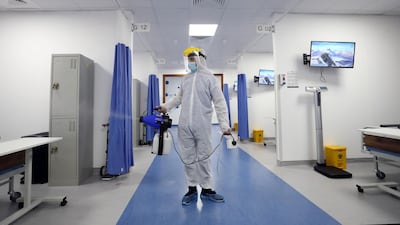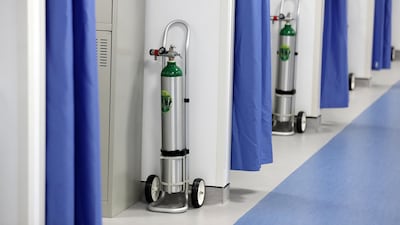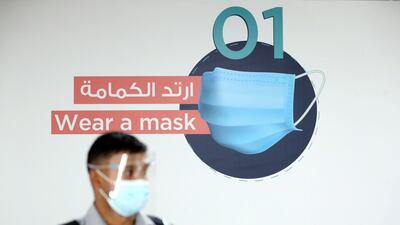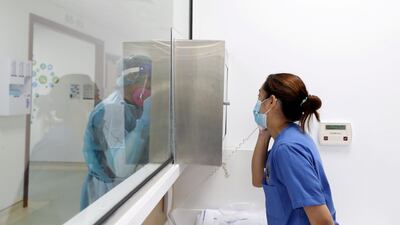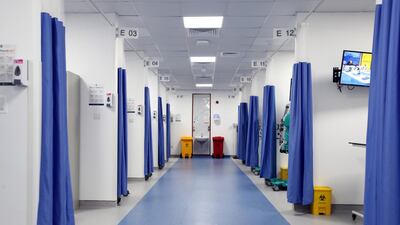Latest: Dubai's field hospital medics on alert, as India surge shows risk of complacency
Dedicated Covid-19 field hospitals in Sharjah, Ajman and Ras Al Khaimah are alleviating pressure on the healthcare system.
The facilities are helping regular hospitals return to normal – and could be repurposed for years once the pandemic has subsided, officials said.
Doctors there warned some young people were becoming lax in adhering to coronavirus measures and urged vigilance as the UAE approaches herd immunity through its vaccine programme.
They also told of how treatment has changed since the early days of the outbreak, with less reliance on ventilators.
The National toured the field hospitals and witnessed firsthand how medics are helping to tame the pandemic.
Dedicated care for Covid-19 patients
A field hospital in Sharjah, which opened last month to monitor people with Covid-19, has so far treated less than 100 patients.
The Mohamed bin Zayed Field Hospital, located near Al Zahia Park, opened on March 28 and has just 21 patients.
Operated by Abu Dhabi Health Services Company (Seha), the hospital has treated more men than women over the past month, with most admitted and discharged within four weeks.
The majority of patients are between 35 and 50, and only a handful with pre-existing conditions.
"The main purpose of having field hospitals is to help Covid-19 patients with dedicated staff," Dr Yousuf Alattar, chief executive of the hospital told The National.
“However, it is not so much about need or demand, field hospitals work to help regular hospitals return back to normal activity and alleviate pressure or stress on normal services.

“Now, we are more prepared and want to be ready for any new waves that may come.”
Dr Alattar said the 7,000-square-metre facility could be operational for “up to 20 years” and could be used for other medical purposes once the Covid-19 pandemic has subsided.
The hospital has treated a mix of nationalities including Indian, Egyptian, Syrian, Pakistani, Bangladeshi and one Emirati.
How field hospitals work
The field hospital has capacity to treat 204 patients in 48 intensive care beds and 156 acute beds.
It has been divided into two zones: the red zone, which houses ICU patients, and the green zone, for acute care.
In the acute care ward, cubicles are divided by walls, with a curtain separating patients from the main corridor for privacy.
The setup is similar in the ICU ward, with larger cubicles for patients needing advanced care.
Dr Alattar said the shortest time a patient spent in the facility was three days and the longest, just eight days.
Most of the patients were discharged with a negative result, but those who became completely asymptomatic after a few days were discharged with a positive result and fitted with a GPS tag to complete their isolation at home.
The hospital has 47 doctors, 151 nurses and 53 ICU nurses, plus other staff, including radiologists, respiratory specialists and laboratory technicians.
Staff have been supplied by Seha from facilities including Tawam Hospital and Al Ain Hospital, as well as from healthcare organisations such as VPS Healthcare and InterHealth Canada.
They work 12-hour shifts and have been provided with dedicated accommodation in nearby hotels.
Vaccinations 'will end pandemic'
While he could not say whether any of the patients treated had been vaccinated, Dr Alattar urged people to get the Covid-19 vaccination.
“In general, what we know is that the number of infections and the number of admissions to ICU is higher when not vaccinated,” he said.
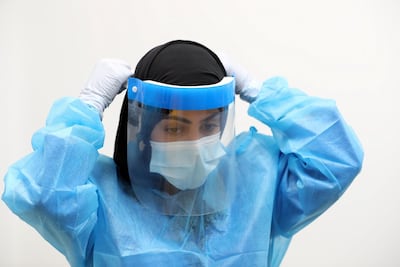
“The vaccination campaign is reducing the severity of the disease which in turn is reducing the strain on field hospitals.
“We have very few ICU patients [at this facility].”
One year on from the Covid-19 outbreak being declared a pandemic, Dr Alattar said some younger people were starting to become lax with regards to safeguarding themselves from the virus.
He advised people to continue being vigilant as the country is "approaching herd immunity", with vaccination efforts and strict safety protocols helping reach this status.
How has treatment changed?
Speaking to The National, Dr Thomas Sebastian, deputy lead physician at the field hospital in Sharjah, said the way he treats patients has changed over the past six months.
“During the first wave, it was all very new. When patients [with moderate cases] came in, we put them on ventilators early,” he said.
“That has changed now. We try to treat certain patients without ventilators as much as possible so the patient can learn to breathe and work to strengthen the lungs and muscles around them.
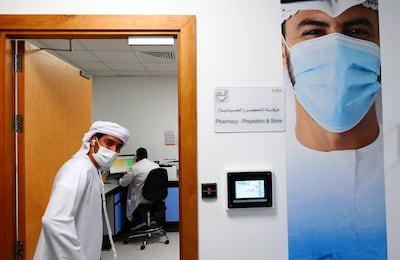
“We can use non-invasive ventilators if needed.”
Despite a number of new Covid-19 variants being reported since the initial outbreak, Dr Sebastian said symptoms have remained similar.
Field hospital in Ajman
Just a 20-minute drive from the facility in Sharjah is the Mohamed bin Zayed Field Hospital in Ajman.
The layout, size and bed capacity is identical to the hospital in Sharjah. Located next to the Sheikh Khalifa Medical City Hospital in Ajman, it opened on March 14.
On the day The National visited, there were nine patients in the intensive care ward.
Ahmed Al Ameri, supervisor for the field hospital in Ajman, said the average age of patients was 40.
To date, staff have not treated any patient who has been vaccinated against Covid-19.
The shortest stay a patient has had at the hospital was two days, while the longest was 14 days.
